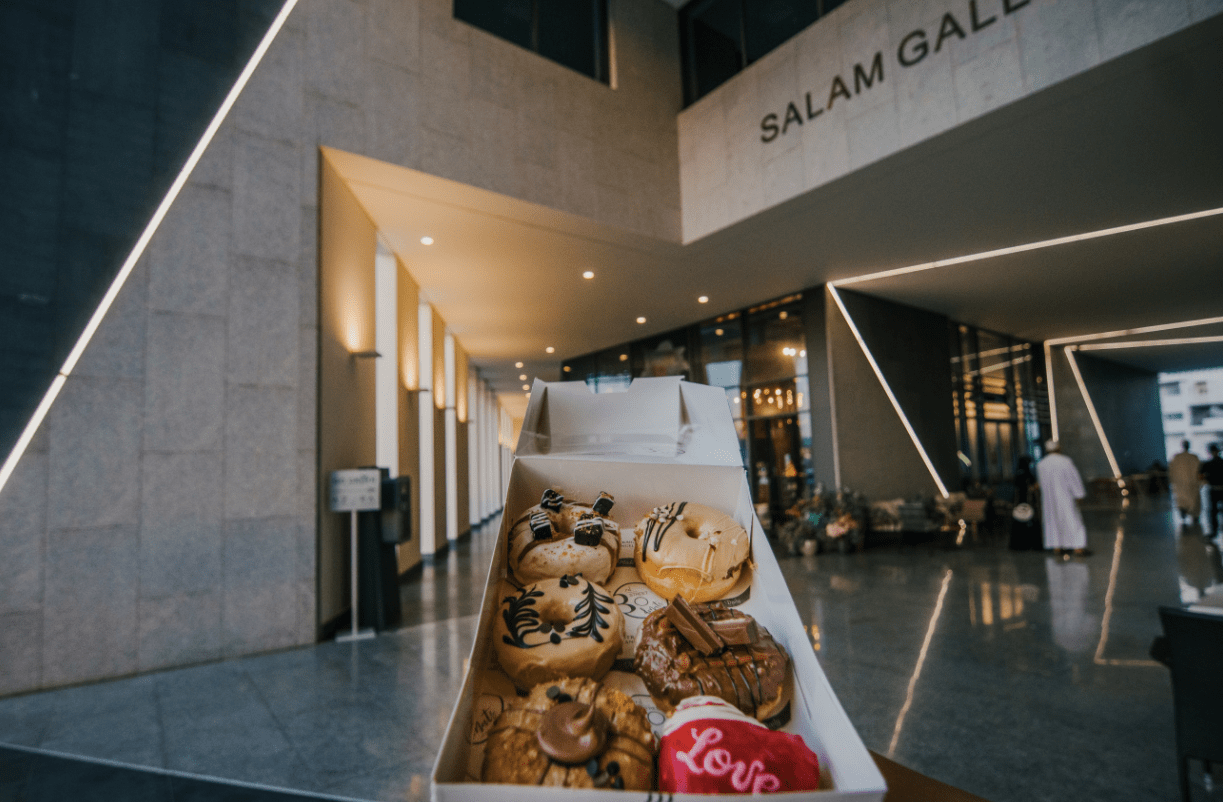Lifestyle
Los Angeles Dessert Innovation Takes Over The Middle East (And The Rest of The World) at 3rd Street Donuts Shop

If you’re ever catching yourself asking where you can find a piece of America in the Middle East, look no further. 3rd Street Donuts is where you can find a list of over a dozen specialty coffees and a one-of-a-kind, secret donut recipe that is directly imported from one of the finest American bakeries in Los Angeles, California.
The shop carries over 120 flavors of donuts, rotating from 40 to 50 flavors a day. They are made fresh daily and decorated beautifully in-house with a wide variety of colorful toppings for every occasion. The shop also offers a wide variety of artisanal hot and iced coffees that resemble those at your typical American coffee shop.
Mundhir al Alawi, founder and owner of 3rd Street Donuts, visited local, family-owned donut shops practically everyday while living in Los Angeles, California. He quickly fell in love with the dessert and the many distinct ways it could be prepared, depending on its unique recipe. Needless to say it didn’t take long for his newfound love of the fluffy treat to trigger the idea of a potential business endeavor.
But in order to remain as authentic as possible to his favorite donut shops in L.A, Alawi knew he’d have to create an American-style donut recipe for his small business. He proceeded to hire an executive pastry chef, and, in collaboration with an American bakery, designed the perfect donut recipe that would later become the secret signature staple of 3rd Street Donut Shop.
Thanks to the Free Trade Agreement between the United States and Oman, the shop’s top-quality ingredients for its secret recipe are imported from California whilst remaining completely duty-free. Since the innovative recipe requires special ingredients from both countries in order for the dessert to remain perfectly soft and fluffy, fellow competitors in the area using local ingredients have tended to fall short in competition.
There are currently three 3rd Street Donut Shop branches in Oman and more to come within the following year. By the end of 2021, the shop will be making its way into Saudi Arabia, Qatar, Dubai, and Bahrain. The business has also recently started accepting franchising applications which can be found on www.3sdonuts.com.
And if a delicious secret donut recipe imported overseas isn’t enough to bring you into the shop, its excellent customer service will do the trick. The shop’s owner made sure to put the customer’s experience at the forefront of his business by training staff to provide both innovative products and a wonderful dine-in experience. Each 3rd Street consumer is meant to be a friend and a lifetime companion of the business. “We are innovative in everything we do, but we always make sure to put the customer first,” owner and founder Mundhir al Alawi explains. “It’s always about making them feel like 3rd Street Donuts is a part of their home, and that whenever they walk into our shop, they understand that they are the most important.”
Join the 38,000+ members of 3rd Street Donuts’ digital family by following @3sdonuts on Instagram and follow their journey on their new locations coming soon. For more information on business opportunities, visit their website.
Lifestyle
From Broken to Whole: The Radical Reawakening Behind The XI Code

Elle dela Cruz
Most healing begins with the assumption that something is broken. That the fix lies in the right therapist, diet, retreat, or ritual. Patchwork solutions for a fragmented self.
But for clients of The XI Code, the breakthrough did not come by fixing what was broken, it came by remembering what was never damaged to begin with.
It is not a spiritual placebo or self-help remix, rather a recalibration, a return, a radical stripping away of every distortion that ever claimed authority over who you are. Founded by Masati Sajady, The XI Code has become a sanctuary for those who sensed there had to be more and now live the proof of it.
This is not talking about polite gratitude or glow-up affirmations, these are accounts of full-system transformation, physical regeneration, identity coherence, and a kind of inner homecoming that makes every previous attempt feel like a rehearsal.
“This isn’t about self-help,” says Masati. “This is about self-realization. There is a version of you untouched by pain, trauma, or time and that is what XI reveals.”
Remembering the Self Beneath the Static
Those who enter the XI space often describe their experience not as something new they learned but as something ancient they finally remembered. One client shared: “I listened to Masati’s podcasts during a bottomless depression. I swear it pulled me from the dark to the light.”
But the words they use are not mystical or out of reach, rather grounded. “I feel safe in my body.” “I’ve come home.” “I finally see myself.”
This is not a performance of healing, it is a quiet, cellular knowing.
“I survived death and decoded life,” Masati explains. “I returned with the blueprint for those ready to rejuvenate the body, unlock peak performance, and evolve humanity.” Those words, radical to some, feel like a memory to others. As if, somewhere deep inside, they always knew this was possible.
When the Body Starts Listening
While XI is not a medical protocol, many clients describe physical transformations that coincide with their inner shift. One wrote: “I’ve begun rendering myself as my highest form, right here, in this space and time continuum.”
Another called it “the most effective healing method” they had found after years of traveling the world for answers. But the common thread was coherence. A recalibration across dimensions: physical, emotional, energetic, and ancestral. It is about resolving distortion at the origin point.
Rewriting the Lens of Reality
After engaging with The XI Code, many report not just feeling better but seeing life differently. Like a veil lifted. Like their perceptual field was reset.
One wrote: “My whole life is changing in every way and it’s just unfolding on its own. Every day, synchronicities. It’s like magic.”
Another put it simply: “I found my home and I wasn’t even looking.” Again and again, the word home appears in these testimonials not as a destination but as a state of being.
Masati explains this with precision: “XI doesn’t upgrade the version of you that’s broken. It reveals the YOU that was never broken to begin with.”
A Quiet, Powerful Community
Though The XI Code is not marketed as a group program, many clients describe a shared energetic field as being held by a collective intelligence moving through similar layers.
“I can’t wait to wake up and see how much more beautiful I’ve become,” one said not from ego but from evolution.
Because the work does not stop when the session ends. The system keeps unfolding, recalibrating, and upgrading.
Not for Everyone But For the Ready
Masati is unapologetic: “The XI journey requires the courage to see Truth on all levels, in all arenas, and to accept responsibility for the Life you’ve been gifted.”
It is not for those seeking a new story to believe in, rather for those ready to remove every distortion that ever told them they weren’t enough.
And what remains? The version of you before distortion and the one that was always whole.
You do not need to become someone new. You need to meet who you were before the noise.
-

 Tech4 years ago
Tech4 years agoEffuel Reviews (2021) – Effuel ECO OBD2 Saves Fuel, and Reduce Gas Cost? Effuel Customer Reviews
-

 Tech6 years ago
Tech6 years agoBosch Power Tools India Launches ‘Cordless Matlab Bosch’ Campaign to Demonstrate the Power of Cordless
-

 Lifestyle6 years ago
Lifestyle6 years agoCatholic Cases App brings Church’s Moral Teachings to Androids and iPhones
-

 Lifestyle4 years ago
Lifestyle4 years agoEast Side Hype x Billionaire Boys Club. Hottest New Streetwear Releases in Utah.
-

 Tech7 years ago
Tech7 years agoCloud Buyers & Investors to Profit in the Future
-

 Lifestyle5 years ago
Lifestyle5 years agoThe Midas of Cosmetic Dermatology: Dr. Simon Ourian
-

 Health6 years ago
Health6 years agoCBDistillery Review: Is it a scam?
-

 Entertainment6 years ago
Entertainment6 years agoAvengers Endgame now Available on 123Movies for Download & Streaming for Free
